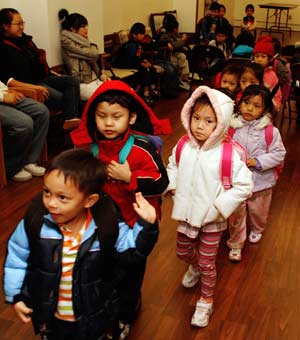MILWAUKEE — The doors open and a flood of children rush through the hallways of the Samaritan House into the old chapel. There are about two dozen, from kindergarten to eighth grade, all bundled up in jackets and wool hats on this late-November afternoon. Many of them are experiencing cold for the first time. All of them are Karen refugees, born in refugee camps in Thailand. Mayhoua Moua tutors 10th grader Paw Mu Ka as Myanmar refugees receive tutoring at the Samaritan House on the grounds of St. Michael Parish in Milwaukee on Wednesday, Nov. 28, 2011. (Catholic Herald photo by Allen Fredrickson)
Mayhoua Moua tutors 10th grader Paw Mu Ka as Myanmar refugees receive tutoring at the Samaritan House on the grounds of St. Michael Parish in Milwaukee on Wednesday, Nov. 28, 2011. (Catholic Herald photo by Allen Fredrickson)
The Samaritan House, the former St. Michael convent at 2414 W. Vliet St., is a tutoring home for these young refugees, helping them with homework and teaching the American way of life.
Fr. Dennis Lewis, administrator of St. Michael Parish, welcomes the new tutoring project.
“This used to be a chapel where people used to pray, then it was ESL (English as a Second Language) classes in here and now it’s your house,” Fr. Lewis tells the kids. “The people here love you, care for you and want you to do well.”
Today, they’re meeting someone new – Bishop Donald J. Hying.
“You’re a long way from where you were born; it’s a very different place, it’s getting colder,” Bishop Hying tells them. The kids listen attentively, but are still children and are fidgeting in their seats. “You don’t have cold at home, do you? So you have to put on jackets.”
InformationFor information on how you can help with the tutoring project, call St. Michael Parish, (414) 933-3143. mayhoua_1@yahoo.com |
Karen is an ethnic term created by the British for people from Burma now known as Myanmar. At the Samaritan House, six ethnicities from Burma are represented.
The children are cold, keeping their jackets on inside.
“It’s a very different place and yet all of you are brothers and sisters in Jesus,” Bishop Hying says. “Each one of you were made by God; each one of you is a son or daughter of God.”
They listen to the bishop, but they have homework to get to and are split up, join their tutors and go into different rooms to start their work.
Mayhoua Moua is the primary force behind the program.
“I came as a young refugee, like (the children) back in the ‘70s and grew up in America,” Moua says. “As a young refugee myself, at the age of 7, spoke no English at all. Fortunately though, the system was very helpful so we were able to get some assistance to get to a level where my parents can learn some English and work at the same time.”
But that was then.
“The services are just not there like (they) used to be,” Moua says.
The program just started in November but already has had an impact on the community.
“When we got it together and the first day (families) came to register, seven families came in to register and that evening 30 kids showed up,” Moua says. Two days later, the number of kids grew to 50.
“We originally wanted to include all children, including children in this neighborhood, but with the number of refugee children, I don’t think we can accept any more,” Moua says.
The current situation in the Milwaukee Hmong community is something with which Moua is familiar. Kindergarten students walk to their classroom as Myanmar refugees receive tutoring at the Samaritan House. More photos from Samaritan House can be viewed at http://photos. chnonline.org. (Catholic Herald photos by Allen Fredrickson)
Kindergarten students walk to their classroom as Myanmar refugees receive tutoring at the Samaritan House. More photos from Samaritan House can be viewed at http://photos. chnonline.org. (Catholic Herald photos by Allen Fredrickson)
“Since we found out about these new refugees, we wanted to do something to help them because we noticed they don’t have the kind of support that we got when we came here,” Moua says. “We didn’t want to duplicate what social services were doing already. We decided we can work on the academic part.”
On Tuesday mornings, two volunteers teach adult literacy classes and after school they tutor children. Those they tutor are not only part of St. Michael Parish, but are from all parts of the city.
The program also isn’t exclusively Catholic, however there about nine Catholic families registered.
Moua says that once the word got out, people began bringing their children to the Samaritan House.
While the kids are off doing homework, Bishop Hying meets with Fr. Lewis, Moua and others involved. They talk about what is needed to expand to help more kids.
Bishop Hying listens and arranges a time to meet with them to go further into detail about what is the next step.
We don’t have enough volunteers that help us,” Moua says. “We need funding to purchase supplies to help the children.”
She says simple things like after- school snacks are important.
“We also have bills to pay here,” Moua says. One couple, she notes, bought workbooks, flash cards and snacks for the children in the first week.
“I would have to say that they spent at least $500 on refreshments and these materials,” Moua says.
Those types of donations go a long way to help them adjust to the culture.
“All of these children were born in the camps,” Moua says. “They’re very, very new. Some of them came as late as just a few months ago.”
Moua has been involved in the Hmong community since she moved to Milwaukee 20 years ago. She worked for a Hmong organization that focused on social services and went on to found The Hmong Women’s Organization.
“With that we continued to provide services to help strengthen family relationships and then from there I moved on to forming my own private firm,” Moua says.
She and her husband, Zongcheng, also a refugee, provide interpretation, translation and consultation of language and diversity to various clients in Milwaukee.
Although Moua is a refugee, she’s from Laos and speaks a different language.
“The only communication I can do with them is English; they don’t speak Hmong and I don’t speak Pakanyao (Karen language),” Moua said. “We use other children that can speak some English to help us interpret along the way.”
That refugee connection is what makes everything worth it for Moua.
“A lot of the things I do, I do because I know my struggles as a young child, so I want to help people so they don’t have to struggle as much,” Moua says.
The work paid off for her and her husband, as they were honored by the St. Vincent de Paul Society and she was the recipient of an Archdiocese of Milwaukee Vatican II Award in November for her work with the community.
“It was a surprise when I got the notice that we were nominated for the award,” Moua says. “I really felt I shouldn’t be the only one that should receive this award. The St. Michael Parish should be acknowledged along with.”
Moua says that at the end of the day, it’s all worth it.
“It doesn’t matter how tired you are, after a long day of work, when 4 o’clock comes and the kids are at the door, their anxious faces wanting to come in to learn and they want help with their homework,” Moua says. “They re-energize you all over again.
